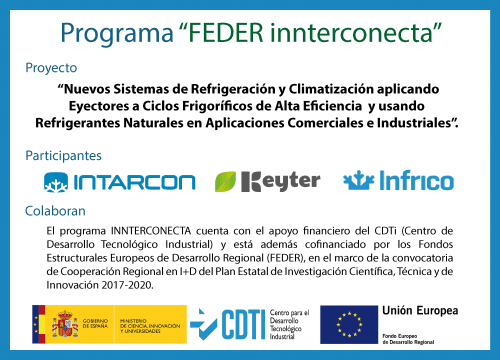
EJERCER project
INTARCON participates in the "FEDER-INNTERCONECTA" R&D projects.
The public entity CDTi (Centro de Desarrollo Tecnológico Industrial) of the Ministry of Science, Innovation and Universities, promotes research and technological development in business R&D through the FEDER-Innterconecta programme. The CDTi shows its support by granting our organisation a subsidy to carry out the project: “New Refrigeration and Air Conditioning Systems applying Ejectors to High Efficiency Refrigeration Cycles and using Natural Refrigerants in Commercial and Industrial Applications” (EJERCER).
The EJERCER project consists of the application of ejectors to refrigeration and air conditioning systems as a state-of-the-art solution that increases their energy efficiency compared to traditional systems, while reducing the environmental impact by using CO2 as a natural refrigerant. These systems have a wide range of possibilities and a lot of flexibility in commercial and industrial applications, from small convenience stores to large supermarkets, even in the hottest climates.
Ejectors are devices that allow the system to continuously and instantaneously adapt to variations in its operating conditions, resulting in improved performance. The complexity of the system is reduced, installation and maintenance costs are reduced, but obtaining higher efficiencies and the same power ranges (kW) as traditional HFC air conditioning and refrigeration systems without ejectors. All this allows us to offer the market a more efficient, sustainable and ecological solution that respects the environment and improves our quality of life, guaranteeing our customers the highest level of satisfaction.
The INNTERCONECTA programme has the financial support of the CDTI (Centre for the Development of Industrial Technology) and is also co-financed by the European Regional Development Structural Funds (ERDF), within the framework of the call for Regional Cooperation in R&D of the State Plan for Scientific, Technical and Innovation Research 2017-2020.
